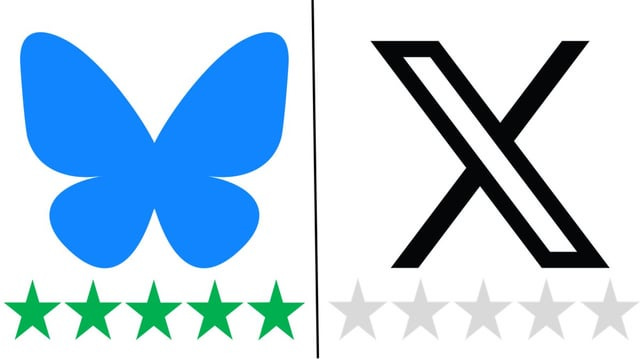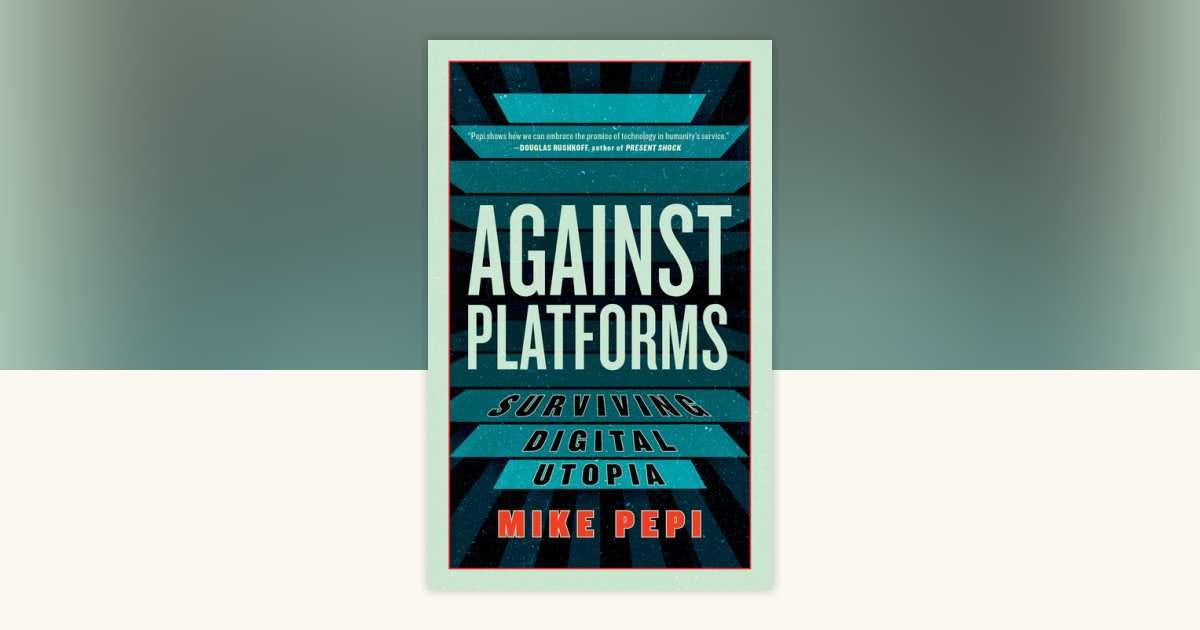Tech Platforms Won't Save You
Substack, BlueSky, and why we need institutions
This piece was originally commissioned by my editor at The Atlantic at the beginning of this year—a couple of weeks before Trump took office again. I don’t think many people understood just quite how insane things would get, especially when it came to critical coverage of the tech industry and its leadership. The essay I wrote was less newsy and therefore ended up getting lost in that flood of coverage around DOGE and the like. The piece was eventually killed due to a lack of editorial bandwidth; my editor knew he wasn’t going to be able to get the essay finalized and published for several more months and we agreed to walk away from it. I’m disappointed, but I loved working with my editor and only wish it worked out.
With that in mind… I’m going to publish it here under an overwhelming weight of irony as this essay is about platforms and institutions and the tension between them. It’s a subject that
has written comprehensively about in his book Against Platforms, and I’ve discussed at length with . was also kind enough to speak with me for this piece, and I’ve included some quotes from her thoughtful perspective on this dynamic. This version of the essay is somewhere between the first and second edit, as I’ve kept some things that were initially cut for space.People like to talk about Bluesky in salvational terms, as if a tech platform can solve problems of the spirit. A recent post in the BlueskySocial subreddit featured a meme of someone breaking a pair of chained manacles above their head, like they were being liberated from bondage: “I just removed X account and create [sic] my BlueSky account,” it reads. Another user called the app an “ethical replacement” for other social media platforms, as if they were buying fair trade coffee or cruelty-free shampoo.
But while there may be fewer white nationalists and phrenology enthusiasts on Bluesky than there are on X, the dynamics are much the same on the two platforms. On social media, people want attention, and they want to convert that attention into influence. For people to put their faith in Bluesky—for people to believe that it will solve the problems they have with X by offering another way to post—reflects a kind of thinking common in Silicon Valley. The tech critic Evgeny Morozov calls the approach “solutionism,” a sort of engineer’s philosophy where, the thinking goes, messy human problems can be solved with elegant lines of code. That conviction has slowly seeped into the mainstream over the last few decades as well, forming a widespread techno-optimism. Consider Facebook, which became a platform celebré during pro-democracy demonstrations in the Middle East as it evolved from a place to share pictures and status updates to a digital chapterhouse where organizers could arrange protests and upload media. The actual impact that platforms like Facebook had on the movement’s momentum have been contested, but for many the associations between the social media giant and political freedoms were solidified. Facebook became a solution for a troubled world.
But, as the tech critic
put it in his book Against Platforms, “You can’t solve a social problem with a technical solution.” Pepi sees the faith that many people have in the power of platforms as a liberating, equalizing, or empowering force as misplaced, and the sign of an adrift population that is desperate for anything resembling a liferaft. Facebook’s role in facilitating the Arab Spring wasn’t because Facebook is actively interested in fomenting democracy; it was the result of humans using a tool in a novel way, like opening a beer bottle with a lighter. An inverted phenomenon can be seen in something like the Rohingya genocide in Myanmar, where Amnesty International accused Facebook of amplifying a “storm of hatred” towards the Muslim minority by feeding users posts they were more likely to engage with, such as ones from nationalist groups calling Muslim human rights activist “national traitors.” “Often, applying technical fixes only treats the symptom, and, in failing to address the underlying cause of the problem, makes it worse,” Pepi writes in one of the book’s opening aphorisms.A similar tension is playing out on the newsletter publishing platform Substack. The platform has no doubt been a success for some whose essays, fiction, and commentary might not otherwise find a home. Some have built robust audiences who pay a few bucks every month to read their favorite writer, and there are even Substack-native outlets with full editorial teams. But Substack is not necessarily a success on its own merits: Legacy media has been enduring a series of crises that have decimated the industry over the last two decades. Consolidation driven by private equity firms has stripmined local newsrooms and destroyed the alt-press ecosystem.
Writers are stuck on a never-ending carousel of layoffs, pivots, and reorgs, which has led both to an exodus from the industry and a desperate desire for an alternative environment. Substack has promised to rescue writers from that churn, and legacy media’s near-constant pattern of screw ups has given the platform a willing audience. Substack’s strongest advocates have argued that the platform isn’t just a website but is more a revolutionary new media ecosystem free from the decadence, incompetence, and instability that has plagued writers this century.
“Substack is the equivalent of Uber or OnlyFans (or Airbnb)... to me this is unequivocally a good thing,” the writer Sam Kahn said in an exchange with Washington Post nonfiction book critic Becca Rothfeld in the magazine The Point. As a writer, the favorable comparison to those tech platforms stopped me short. Surely, we know enough about the gig economy to understand its manifold instabilities and abuses. Uber has been embroiled in wage-theft lawsuits and many drivers that use the platform say they’re struggling financially. Airbnb has effectively become a shadow hotel industry and pushed up residential rents across most of the country. Even OnlyFans, which has been a financial lifeline for many sex workers, has shown the kind of chaos that potential changes in terms of service and content moderation practices can cause.
It’s not that Substack is devoid of value.
’s analysis of technology and culture is exceptional, and reading ’s wildly successful publication Feed Me is like eavesdropping on several interesting conversations simultaneously. But it is, at its heart, a blogging platform like any of the dozens that came before it. The exceptions at that intersection of thoughtfulness and financial success are few, and not enough to replace the tens of thousands of journalism and writing jobs that have been lost over the last few years.Far from solving the challenges facing the media industry, Substack, much like the tech companies that evangelists like Kahn compare it to, is creating a poor facsimile that is might be more unstable than the systems it’s seeking to replace. Writers on the platform are pitted in competition against each other for a limited pool of subscriber dollars and with marquee names—pundits like Matt Yglesias, journalists like Taylor Lorenz, public intellectuals like Paul Krugman—able to readily capitalize on their public profiles, lesser-known writers have an uphill climb to finding a paying audience. “If you subscribe to 10 people, it’s $800. That’s crazy. But all of the ad dollars have gone to tech,”
told me. “I do ultimately think that a move towards a more independent media ecosystem is good in most ways because of how things used to be, especially for women and other marginalized people. But the legacy people like myself and others have an enormous advantage because we've already built our brand names in a completely different system.”The winners have a vested interest in making sure the platform becomes the center of a new industry, hence the spirited cheerleading. Those power users know the internet economy is still winner-take-all, but I’d argue that far from a new tech utopia for writers, what many of the platform’s most ardent supporters actually want is a new media ecosystem that looks a lot like the old one—except this time, they’re on top.
It isn’t the promise of equality or idealism that drives a lot of these evangelists but something more base: resentment. Many of the loudest crusaders on Substack are people who are equally convinced of their genius and of the world conspiring against them. Woke or women or liberalism has ensured that their novels aren’t respected as classics, that their prose isn’t in every major magazine week in and week out. Those disgruntled fiefdoms are starting to grow in influence and reach. Bari Weiss’ Substack publication The Free Press has hired dozens of columnists, staff writers, and editors thanks to booming subscription numbers — as of April, they have nearly 155,000 paying readers — and investments from the likes of Marc Andreessen and David Sacks.
It’s similar to the influence land grab happening on Bluesky, even though the platform’s leadership would have users believe that the product is categorically different because of its decentralized network protocols. “There isn’t just one king ruling over the whole network,” Bluesky CEO Jay Graber said in a 2019 speech explaining how the “federated” system that would ensure the social network wouldn’t be subject to the whims of a single person. “But there are smaller lords who still have absolute power over their domain.”
I got a late start as a professional writer, so I’m not unsympathetic to the status anxiety playing out on Substack and Bluesky. The feeling has always been that if you have enough followers, you’ll eventually be exempted from the stresses of trying to cobble together a sustainable existence as a writer or artist. The tradeoff is that you’re forced to play a character in order to claim people’s attention, which can lead to a sort of permanent performance that can cheapen and warp your work.
We’ve seen what can happen when people put too much faith in a platform. Far from a 1st amendment paradise, Musk’s X has become an arbitrary censorship zone that seems to reflect its owner’s personal politics rather than any commitment to unmodified expression. (Ironically, Dorsey called X a “freedom technology” upon leaving Bluesky’s board, joining the rightward lurch of many Silicon Valley titans.) News stories get throttled, conspiracy theories get boosted, accounts get suspended for spurious reasons. And it’s not just progressive voices that get the digital muzzle. In December of last year, more than a dozen influential conservative accounts claimed they lost access to X’s premium features after they created posts that disagreed with Musk’s perspective on immigration reform. The far-right agitator Laura Loomer called it “pure retaliation.”
Bluesky, too, can sometimes feel like a platform dominated by the hypersensitive and terminally online, with its low-tolerance for flame wars and pre-emptive attempts to ban users the community finds distasteful. Loomer, hilariously, was also at the center of a BlueSky controversy after she claimed she was banned within an hour of joining the site simply because her reputation preceded her.
All of this is happening while the general, bipartisan distrust in media continues to crater. People seem intent on making the internet into a series of personal echo chambers, desperate to confirm their own outlooks and anxieties. It’s been said that there are “many” Blueskys and Substacks so that people can tailor their experiences on the platforms to what works for them. But that atomization—or, indeed, loneliness—can lead to a fracturing of our shared reality and be a means of stoking paranoia and fear. Credulity isn’t a good default setting, but neither is the “do your own research” directive that seems to drive many on social media platforms.
In January, I deleted the X app off my phone. The reasons were more mundane than virtuous; the racist trolls were toxic and I don’t blame anyone for leaving to escape that, but I also found that the platform was like an abandoned mall you used to hang out in. Because external links are throttled, writers I know hardly use X to promote work since there’s less of a chance to catch the eye of an editor or build an audience. I still have my X account, same with Bluesky. I don’t find any of them that different from one another, but I guess that was never the point.






Alanis Morissette could never comprehend…
But in all seriousness, this is a great piece. There’s a lot of nuance here. To me, platforms today feel a bit like early zine culture (just… less cool). They’re places where writers and cultural commentators can find their voices before moving into institutions with perspective, resources, and real editing chops.
The danger, as you note, is the flattening effect of algorithms. Everything pulled toward sameness, attention-chasing, and lowest-common-denominator performance. That’s where platforms fall short of true cultural stewardship. At least that is what is pushed to the top. Like old zines, they do foster hidden pockets of subculture, and I think that’s a good thing.
I think the answer lies somewhere in the middle. Ideally, some future journalists are cutting their teeth here on Substack while legacy institutions figure themselves out, and when the dust settles, the best of them migrate back into edited environments. Editorial selection is crucial to preserving depth and cultural continuity, but it also needs that messy, experimental undercurrent to balance it out. These days, that undercurrent is going to live online, whether we like it or not. (Still: I miss a good zine.)